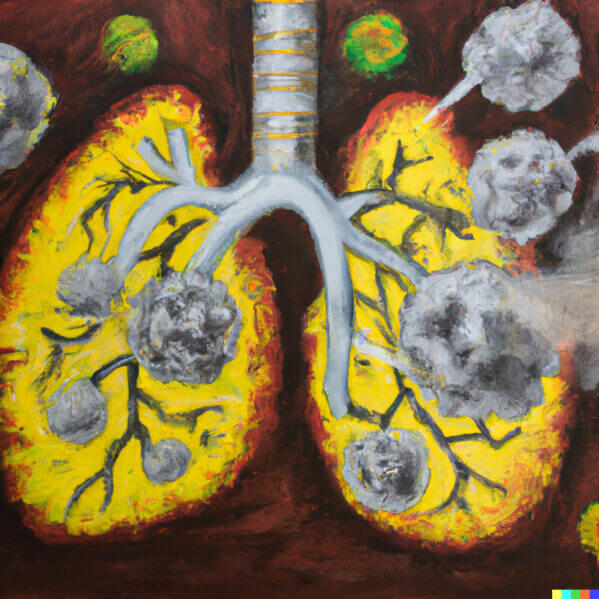Summary: Researchers have identified the cause of persistent lung problems after COVID-19 infection and found that existing arthritis medications could potentially treat these issues, offering hope for millions suffering from long COVID.
Estimated reading time: 8 minutes
A team of scientists from the University of Virginia School of Medicine and Cedars-Sinai has uncovered the root cause of lingering lung problems in COVID-19 survivors and identified existing arthritis drugs as potential treatments. This discovery could provide relief for millions of people worldwide who continue to experience lung issues months or even years after recovering from COVID-19 infection.
The study, published in the prestigious journal Nature, reveals that a malfunction in the immune system’s healing process leads to persistent inflammation and scarring in the lungs, a condition known as post-infection lung fibrosis. Currently, there are no effective treatments for this condition. However, the researchers found that drugs already approved for treating rheumatoid arthritis and alopecia, such as baricitinib and anakinra, could potentially disrupt this harmful immune response and allow damaged lungs to heal.
Why it matters
Long COVID, or post-acute sequelae of SARS-CoV-2 (PASC), has emerged as a significant public health concern affecting tens of millions of people globally. The identification of existing, approved drugs as potential treatments for lung fibrosis could accelerate the development of therapies for those suffering from long-term COVID effects, potentially improving their quality of life and reducing the burden on healthcare systems.
Unraveling the Immune System’s Role
The research team, led by Dr. Jie Sun from UVA’s Carter Center for Immunology Research, used advanced technologies to examine damaged lung tissues from transplant patients and develop a new laboratory model to study the condition.
“Using advanced technologies like spatial transcriptomics and sophisticated microscopy, we compared lung tissues from patients and animal models we developed in the lab,” Dr. Sun explained. “We found that malfunctioning immune cells disrupt the proper healing process in the lungs after viral damage.”
The scientists discovered that immune cells called CD8+ T cells were interacting abnormally with macrophages, another type of immune cell. This faulty interaction caused the macrophages to continue driving inflammation even after the initial COVID-19 infection had cleared, a time when the immune system should normally calm down.
Dr. Chongzhi Zang, from UVA’s Department of Genome Sciences, highlighted the importance of the technologies used in the study: “‘Spatial-omics’ are state-of-the-arts technologies that can measure the molecular features with spatial location information within a sample. This work demonstrates the power of spatial transcriptomics combined with data science approaches in unraveling the molecular etiology of long COVID.”
Potential for Wider Applications
While the study focused on lung damage caused by COVID-19, the researchers believe their findings could have broader implications. Dr. Peter Chen, the Medallion Chair in Molecular Medicine at Cedars-Sinai, noted, “This study shows that treatments used for the acute COVID-19 disease may also reduce the development of chronic sequelae, including lung scarring. Our work will be foundational in developing therapies for lung fibrosis caused from viruses or other conditions.”
Breaking the Cycle of Inflammation and Fibrosis
The research team’s findings suggest that the harmful cycle of inflammation, injury, and fibrosis in the lungs can be interrupted using existing drugs like baricitinib and anakinra. These medications, already approved by the FDA for treating rheumatoid arthritis and alopecia, work by targeting specific inflammatory pathways in the immune system.
While more research is needed to confirm the effectiveness of these drugs for treating post-COVID lung fibrosis, the discovery offers hope for developing targeted therapies. Dr. Sun emphasized the urgency of this work, stating, “Tens of millions of people around the world are dealing with complications from long COVID or other post-infection syndromes. We are just beginning to understand the long-term health effects caused by acute infections.”
Looking Ahead: Challenges and Opportunities
The identification of potential treatments for post-COVID lung fibrosis marks a significant step forward, but several questions remain:
- How effective will these arthritis drugs be in treating lung fibrosis in human patients?
- Are there any long-term side effects of using these medications for this new purpose?
- Can this approach be applied to lung fibrosis caused by other viral infections or conditions?
As research continues, the scientific community remains cautiously optimistic about the potential for these findings to improve the lives of long COVID sufferers and advance our understanding of post-viral diseases.
Quiz:
- What type of immune cells were found to have faulty interactions in post-COVID lung fibrosis? a) B cells b) CD8+ T cells c) Neutrophils
- Which existing drugs were identified as potential treatments for post-COVID lung fibrosis? a) Antibiotics b) Steroids c) Baricitinib and anakinra
- What advanced technology was crucial in uncovering the molecular causes of long COVID? a) MRI scanning b) Spatial transcriptomics c) X-ray crystallography
Answers:
- b) CD8+ T cells
- c) Baricitinib and anakinra
- b) Spatial transcriptomics


